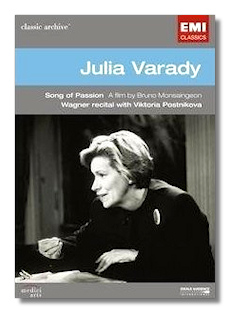
The Internet's Premier Classical Music Source
Related Links
-
Schubert Reviews
Tchaikovsky Reviews
Wagner Reviews - Latest Reviews
- More Reviews
-
By Composer
-
Collections
DVD & Blu-ray
Books
Concert Reviews
Articles/Interviews
Software
Audio
Search Amazon
Recommended Links
Site News
 DVD Review
DVD Review
Julia Varady, Song of Passion

Film by Bruno Monsaingeon
- Richard Wagner: Wesondonck-Lieder
- Piotr Ilyitch Tchaikovsky: Kabï znala ya, Op. 47 #1
- Franz Schubert: Tod und das Mädchen, D.531 (rehearsals) *
Julia Varady, soprano
Viktoria Postnikova, piano
* Dietrich Fischer-Dieskau, piano
EMI Classics DVD DVB3884589 93:49 Full Screen
It puzzles me that Julia Varady, born Julia Tözser in 1941 to Hungarian parents living in Romania, is not better known. Her singing is rich and exciting, and she is a consummate professional. She has had a long and distinguished career that took her to most of the major opera houses, and she has made a fair number of recordings. (Recordings do not even begin to encompass the breadth of her operatic repertoire, however.) Did her marriage to Dietrich Fischer-Dieskau in 1977 hold her back somehow? Rest assured there's no reason to believe that she was riding his coattails; her voice and intelligence speak for themselves. Nevertheless, Varady's relationship with one of the great baritones of all time certainly has aided her as a professional. In the course of this CD, we see her husband acting as her on-stage partner (in snippets from Il Tabarro and Arabella), vocal coach, accompanist, and conductor. The bonus segment on this DVD shows her rehearsing Schubert's Death and the Maiden with him in 1996. He puts her through her paces alright, but even then, her hand moves to caress his back, and for a brief and moving moment, the image of a devoted wife blots out everything else.
Monsaingeon's 55-minute portrait covers a lot of biographical material, from Varady's early years in Romania, to her early successes in Cluj and Frankfurt-am-Main, to her decision, in 1998, to retire from opera and to devote herself to recitals and teaching. We see numerous performance and rehearsal clips – all of them tantalizing because they are too short. These alternate with footage of the soprano herself, the sea in the background, seriously but graciously speaking in several languages to an unseen (and unheard) interviewer. The tone is mostly controversy-free (perhaps that's the answer to the question I raised in the first sentence of this review!), although it's apparent that she has little patience for present-day stage director-auteurs whose arrogance and thirst for outrageousness trumps everything else. One senses that Varady is a little old-fashioned, and more power to her for that!
From Paris in 1998, we are given Wagner's five Wesondonck-Lieder and an encore by Tchaikovsky – again, directed by Monsaingeon. (His documentary shows her rehearsing the Wagner with Postnikova.) While effective and highly communicative, this is a surprisingly intimate performance of the Wagner, as if Varady didn't want to blow the audience out of the hall. Postnikova is positively reticent. The close camera-work is a little excessive at times; we really don't need to know what only Varady and her dentist should know! Both here and in the documentary, the sound and image are first-class.
This is an unexpected but very welcome release in EMI's Classic Archive series. I hope it wins new friends for Varady, and if it does, maybe we will be given a fuller opportunity to see or hear the complete performances only sampled in Monsaingeon's documentary.
Copyright © 2007, Raymond Tuttle




















